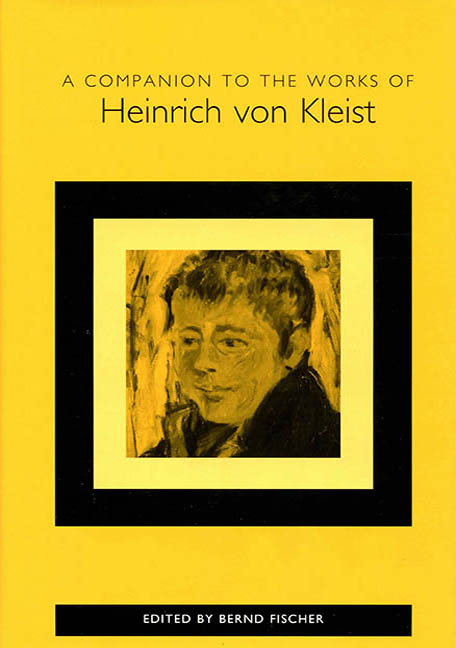Introduction: Heinrich von Kleist's Life and Work
Published online by Cambridge University Press: 27 April 2017
Summary
Life
Bernd Heinrich Wilhelm von Kleist was one of the most innovative, colorful, and enigmatic authors of the turbulent first decade of the nineteenth century. He did not belong to any particular school of literature but explored the intellectual and aesthetic structures of his time from a radical intellectual stance and with a unique literary voice. Many of his works can be read as experimental case studies of the possibilities and limits of contemporary thought and poetics. These literary experiments are of sufficient complexity to disallow simple and comfortable results. Instead, they tend to expose troubling contradictions and to raise fundamental questions about the capacities of language, communication, metaphysical orders, and existential antinomies. This may be the primary reason why Kleist's dramas and novellas have been at the forefront of the German literary canon for 150 years. Even today they possess an uncommon staying power, having survived all twentieth-century shifts in literary fashions and intellectual paradigms from realism to expressionism, from political analysis to formalism, and from existentialism to poststructuralism. As any German teacher or any analysis of the history of German studies can attest, readers and scholars alike continue to find immediate and personal access to Kleist's aesthetics, and many continue to be amazed at how Kleist's works foreshadow the concerns and literary tastes of generations of readers. Kleist achieves all of this without relying on atemporal poetic norms (as could be said about German classicism) and without postulating the permanence of infinite longing as the central charge of literary modernity (as do his Romantic contemporaries). Rather, Kleist combines exceptional literary talent and a sophisticated sensitivity for the hidden antinomies of his world at the threshold of modernity with a radical bent for the extreme; and he does not shy away from scenes of shocking brutality and unsettling absurdity, as well as irritatingly grotesque yet seductive images and narrative strategies.
Often perceived as far ahead of his time, Kleist can, nevertheless, be understood as a son of that time — albeit a uniquely radical one. Like his classicist contemporaries, he attempted to merge the mythological drama of Greek antiquity with dramatic forms of political psychology and modern realism.
- Type
- Chapter
- Information
- A Companion to the Works of Heinrich von Kleist , pp. 1 - 18Publisher: Boydell & BrewerPrint publication year: 2003



